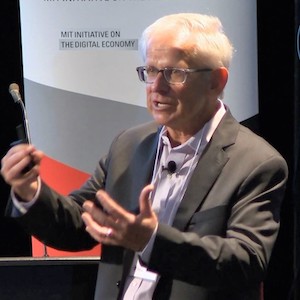The New Rules of Healthcare Platforms (Part 3): Platform Thinking Expands from “Technology” to Business Model & Strategy
 Vince KuraitisToday in healthcare, platforms are understood mostly as “technology”. That’s not wrong, but it’s limiting. We want to offer you a more expansive view of platforms, and in turn, understand platforms as being more than just technology.
Vince KuraitisToday in healthcare, platforms are understood mostly as “technology”. That’s not wrong, but it’s limiting. We want to offer you a more expansive view of platforms, and in turn, understand platforms as being more than just technology.
This post is the third in our series on The New Rules of Healthcare Platforms. In this essay, we will:
- Explain why platform business models are NOT new
- Share a survey of health plan execs that documents a view of platforms as “technology”
- Explain how network effects are the North Star of platform business models and strategy
- Expand your view of platforms beyond just “technology”
Platform Businesses are Not New
Platforms facilitate connections.
While digital technologies have turbocharged platforms, platform business models are not new. Here are some examples:
- Bazaars, shopping malls, swap meets, auctions: connecting buyers and sellers
- Magazines, newspapers, broadcast TV, radio: connecting readers, viewers, and listeners with advertisers
- Credit cards: connecting retailers and cardholders
- Real estate multiple listing services: connecting sellers and brokers
- In healthcare, the National Resident Matching Program: connecting medical graduates with residency programs
Platform businesses have always faced a common challenge—gaining critical mass on two (or more) sides of the platform. Without a base of buyers, why would sellers join the platform? Without a base of sellers, why would buyers join the platform?
Survey: Health Plan Execs Focus on Platforms as “Technology”
While platform business models are not new, digital technologies have dramatically increased the viability, scale and scope of platform businesses.
Today’s digital technology platforms are powerful! Yet, we perceive that many—especially in healthcare—have a limited view of digital platforms. We observe that platforms are understood mostly as “technology”.
Infosys and HFS conducted a survey of health plan CXOs.

The results of the survey were paradoxical. On one hand, over 90% of respondents saw their platforms as “must-have” vs. “nice to have”.
Yet, when asked about key objectives for deploying their platform, the single greatest response was “reducing administrative costs” (38%). This suggests that health plans CXOs view their platforms as highly tactical—vs. strategic.
While this one survey isn’t conclusive, it is consistent with our own interactions with executives across healthcare organizations—that platforms are understood mostly as technology.
What’s missing here? A view of platforms as central to an organization’s business model and strategy–the ability and need to create network effects and to trigger exponential GROWTH!
Network Effects are the North Star of Platform Business Models
Across many industries, platforms are increasingly being understood as powerful business models. We’re aware of more than 45 books that discuss platforms as business models and strategy. Several of these focus on the dark side of platforms—they make the case that digital platforms can be too powerful.
 Randy WilliamsHow can you tell whether a company is thinking beyond platforms as just technology? A critical leading indicator is whether their discussions of platforms include discussions of network effects.
Randy WilliamsHow can you tell whether a company is thinking beyond platforms as just technology? A critical leading indicator is whether their discussions of platforms include discussions of network effects.
Achieving network effects must be the guiding North Star of a platform business model. Network effects are the phenomenon whereby a product or service gains additional value as more people use it.
Once the topic of network effects is introduced, there’s a cascading list of next-order issues to address, e.g.:
- What are the potential types of network effects that could be achieved?
- What’s the strength of various network effects?
- How can the platform overcome the chick/egg (cold start) problem?
- How should the platform be monetized?
- Is there potential for winner(s)-take-all (WTA) dynamics?
- Are improving unit economics demonstrable as network effects take hold?
Here’s a test that provides a big clue as to how a company thinks about platforms. Review a company document, e.g., a business plan, a pitch deck, an investor presentation. Count the number of times the term “platform” is used. Then count the number of times the term “network effect” is used.
We performed this test on a publicly traded health plan’s investor presentation. “Platform” was mentioned 45 times; “network effect” was mentioned zero times.
Expand Your View of Platforms Beyond Just “Technology”
Just for fun, we posed a question to ChatGPT: “How are platforms more than just technology? What about platform business models?” ChatGPT provided a thoughtful answer:
Platforms are more than just technology in the sense that they involve the creation of a framework or infrastructure that enables different parties to interact and exchange value. While technology often plays a key role in the operation of platforms, it is not the only factor that defines them.
Platforms can be thought of as systems that bring together two or more different groups of users (such as buyers and sellers, or creators and consumers) in order to facilitate the exchange of goods, services, or information. Platforms create value by enabling these interactions and providing a means for users to connect and interact with one another.
Platform business models are based on the concept of creating and operating a platform that enables the exchange of value between different groups of users. In a platform business model, the platform owner typically does not produce the goods or services being exchanged, but rather provides the infrastructure and framework that enables the exchange to occur. The platform owner may also facilitate the exchange by providing services such as payment processing or customer support.
Platform business models can be found in a variety of industries, including retail, transportation, media, and technology. They can be digital or non-digital, and can involve a variety of different technologies, including web-based platforms, mobile apps, and physical infrastructure.
We (and ChatGPT!) have a broad interpretation of platforms. We encourage you to think broadly about platforms as well.
The bottom line of today’s post: Platforms are sooo much more than simply technology.
Article Series - The New Rules of Healthcare Platforms
- Login to post comments